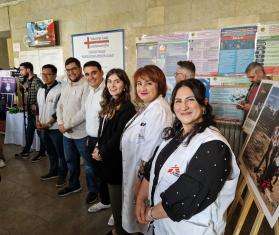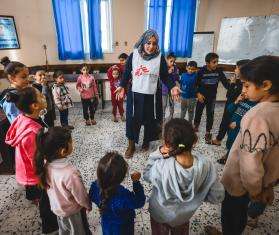“Many of us had everything we needed,” said Francis, a Venezuelan migrant. “But suddenly found ourselves with nothing but a little bag of dreams to hold onto as we seek to work and rebuild our lives."
Every day, hundreds of people cross the border between Peru and Ecuador with the hope of finding a better life. Their journeys come with the threat of sexual and other forms of violence and the risks of having little or no access to health care and basic needs. To address the needs of people on the move, Doctors Without Borders/Médecins Sans Frontières (MSF) set up a clinic in Aguas Verdes, a border town in the Peruvian department of Tumbes, where for over a year, our teams provided medical, sexual, reproductive, and mental health care—and witnessed firsthand the dire conditions and experiences that people face while seeking safety across borders.

Peru is the second-largest destination for Venezuelan migrants and refugees worldwide, according to the UN Refugee Agency, and hosts more than 1.5 million Venezuelans. Its northern border is the primary point of entry for people on the move, connecting Aguas Verdes with the Ecuadorian city of Huaquillas. In October 2023 alone, about 10,000 migrants and refugees, mostly from Venezuela, crossed into Peru through this border and over 9,800 people exited through the same crossing, according to the International Organization for Migration. For some, it’s merely one stop on their journey north to Mexico or the United States, or south to countries like Bolivia and Chile.
But beyond numbers and migration routes are the real people living the reality of life on the move. People like Francis, a 49-year-old woman suffering from hypertension who left Venezuela five years ago carrying the weight of her suitcases, but also her dreams, through this border crossing. Or Daijer, who had been away from home for six years, remembering how much it hurt not being able to hug his mother. He was traveling with his brother and sister-in-law, looking forward to the outcome of a pregnancy test that would reveal whether he would become an uncle.

Many of these experiences were shared with MSF teams during our time at the clinic. Now, upon concluding activities there, our teams reflect on the challenges they faced and the stories they heard.
Finding a safe space for care
MSF set up the clinic in front of the land terminal in Aguas Verdes and provided care Monday through Saturday for over a year. Some of our patients were receiving health care for the first time since embarking on their journey.
"People did not have to come to us. Instead, we came to them," explains Roland Fourcaud, MSF project coordinator. "Our presence on the frontline allowed us to quickly assess people's needs and provide a tailored health response, while collaborating with the local health system and other actors to coordinate humanitarian aid efforts effectively," adds Fourcaud.
Our patients included families with young children, women fleeing sexual and gender-based violence at home, single men, and adolescents. The clinic was also available to Peruvians without access to health care and people settled in towns near the Ecuadorian border, such as Tumbes, Aguas Verdes, and Zarumilla.
The most common health issues we observed among people on the move were respiratory infections, diarrhea, and headaches. Many health problems are caused by the stress of the journey itself. “Additionally, many people suffer from muscle or joint pain due to the excessive weight they carry,” explains David Ramirez, a doctor at the MSF clinic. “They usually carry all their belongings in suitcases on their shoulders or carry their children in their arms, which causes the pain.”
For patients settled in Tumbes, the most frequently observed health conditions included diabetes, asthma, hypertension, tuberculosis, and HIV. Patients with acute or chronic diseases were able to control and monitor their condition.

"Mom, I'm fine. I've made it to the border."
Let's work together to beat polio and measles by protecting your children with the vaccine—so goes the chorus of a Peruvian salsa song that MSF health promoters used to promote a vaccination campaign against polio and measles in collaboration with the Peruvian Ministry of Health, using megaphones to invite people to visit the MSF health post.
The health promotion team provided a variety of services at the clinic, and a play area for children to take a break from the road. There was also an information and advice point on common diseases in the area, like leptospirosis and dengue, and a connectivity site so people could recharge their cell phones and communicate with their family or friends.

MSF health promoters (left) and the children's play area. Peru 2023 © Lisa Mena/MSF
Many of those who pass through this crossing have had their cell phones stolen or lost during the trip, so the clinic also provided them with a phone to talk to their loved ones about their journey. Sofía Castaño Villada, a social worker, said it was heartwarming to hear people say, "Mom, I'm fine. I made it to the border."
Fernando, 19, went to the MSF health post to get breakfast before continuing to his destination, Venezuela, by foot, car, truck, and bus. He had traveled from his home in Santa Cruz, Bolivia, accompanied by his pet rabbit, Sarita. "With her, I don't feel lonely or bored,” he said. “For me, it's motivation that she accompanies me. It makes the road smoother and happier. I talk to her, and she listens."

The lurking threat of sexual violence
The MSF clinic also provided care for people who had experienced sexual violence during their journey or in their countries of origin. "We treated physical wounds, but we also wanted [patients] to know that we were there to listen to them. In the case of women, in particular, they often told us that their first experience of sexual intercourse was forced," says Milagritos Valderrama, MSF medical coordinator. Valderrama is an obstetrician from Pucallpa, a town in the very heart of the Amazon jungle, and was part of the team that established this border post.
To support survivors, MSF teams offered medical care, psychological assistance, and preventive treatment to avoid sexually transmitted infections such as HIV and syphilis. Nearly 3,000 sexual and reproductive health services were provided at the health post, including gynecological consultations and prenatal check-ups.
"Those who suffer sexual violence avoid exposing what has happened to them because they need to continue on their way without thinking about the pain and anguish it has caused," explains Paul Diaz, MSF mental health referent. "They disconnect psychically and emotionally, they become robots who do not enjoy anything enjoy anything. They do not live and do not want to feel.”
The realities of life on the move—the constant movement, the urgency to reach a safe place, and irregular legal status—can present challenges in accessing comprehensive care. For this reason, Diaz could only provide single, standalone consultations. During each session, he shared useful tools to protect patients’ mental health as they continued their journey. "My recommendation was always that, once they were settled, they should seek psychological services to continue the process and heal the open wound."

Health care for women on the move
Many women who attended sexual and reproductive health consultations at the MSF clinic were hesitant to undergo an examination because they did not have access to proper hygiene during their migration journey, such as showers and menstrual care.
MSF obstetrician Judith Godos realized that providing hygiene kits was crucial for the women’s wellbeing. The kits included items such as menstrual pads and wipes to help women maintain their dignity throughout their journey. Having access to a bathroom in the clinic's offices also helped make them feel more comfortable and at ease.
Many women who required care at the health post did so for vaginal infections, such as cervicitis, urinary tract infections, or pelvic inflammation, but they also received pregnancy tests, prenatal care, and general information and guidance on sexual and reproductive health. People from the LBGTIQ+ community were also provided with care. "Many people wanted to do family planning and have a safe sex life, whether they were on the road or settled," said Monica Gonzalez Gutierrez, MSF obstetrician.
Members of MSF’s sexual and reproductive health team recalled that people requested long-term contraceptive care, such as implants, injections, and oral contraceptive pills. People found it challenging to obtain these contraceptives due to theft along the way or a lack of access to comprehensive health care.

Longing for home
"Returning to family is what we long for the most,” says Kevin, 26, who had come to Peru in 2017 from Lara, Venezuela to find work. He traveled with his wife, son, cousin, and more backpacks than they could carry. Over the years, as their family grew larger, their situation changed, and they decided to return to Venezuela.
"It has been six years since I have seen my mother, my grandparents, or my uncles and aunts. They still don't know my son," he said.
Francis from Venezuela echoed the sentiment: "We long for the day we can return to our homeland. Our roots are there; it's the place we were born and where we have lived our entire lives. It's where our families, neighbors, and childhood friends are, and we hope to one day be reunited with them."
Teams at the MSF clinic provided medical care to more than 2,200 people. At the hydration point, over 46,400 people were assisted and about 33,480 received counseling on various health issues. Although MSF's activities have ended, we continue to mobilize efforts to provide humanitarian aid for emergencies.
"In the end, our goal was to provide the best quality care, and the most appropriate treatment during their short stay with us," said Valderrama. “We guided and referred them to access health care if they moved to another location. And if at any point they needed to come back to us, they knew they could always come back."




